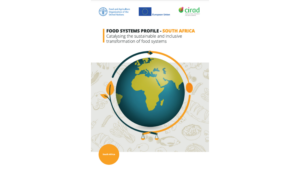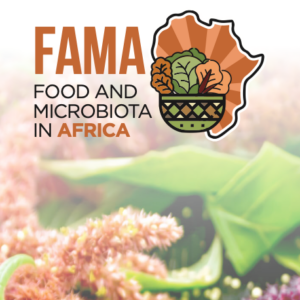
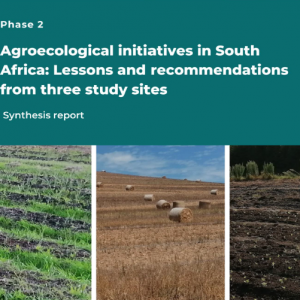
Background to the study
Low- and medium-income countries face several interlinked sustainability challenges. In particular, food systems must provide food and nutrition security, decent jobs and incomes, and adapt to climate change in a context where government budgets are constrained. Agroecological approaches are increasingly recognised as relevant solutions for ensuring sustainable food production and security under climate change and without any negative environmental impacts.
Several knowledge gaps exist about the possible contribution of agroecological food systems for sustainable development and, particularly, their capacity to provide:
- food security: sufficient, affordable, nutritious and healthy food for rural and urban populations;
- decent jobs and incomes; and
- food production that respects the environment while adapting to climate change.
Ongoing projects and research initiatives mostly focus on the socioeconomic and environmental assessment of agroecological practices at the farm and landscape levels. In addition to addressing this core level of analysis, the Transitions to Agroecological Food Systems (TAFS) project also deals with public policies and food systems.
This research report is the second phase of the multi-stage TAFS project. The first phase provided an overview of actors, policies and discourses on agroecology in South Africa, at the national level1. It also identified possible sites of existing agroecological transitions to be investigated during the second phase. These sites are Overstrand Local Municipality (LM) in the Western Cape; Matatiele LM in the Eastern Cape; and Inchanga in eThekwini Metro in KwaZulu-Natal (KZN).
The objectives of the research are:
● to describe, analyse and characterise the food systems engaged in agroecological transitions in the selected sites;
● to understand how national, provincial and local government policies and initiatives supporting agroecological practices are translated at the local level;
● to understand how national, provincial and local government policies and initiatives constrain agroecological practices at the local level;
● to identify initiatives from local state and non-state actors supporting the transition to agroecological food systems at the territorial level, to put into perspective the evolution of these systems with their institutional and political environment at the territorial level;
● to provide a basis for the analysis of the possible evolutions of food systems (phase three of the wider project); and for the identification of the main value chains, activities and practices, as well as actors of the food systems, whose socioeconomic performance will be studied further (phase four).
The research ultimately aims to identify the levers which can facilitate the development and progressive transition to agroecological practices and the evolution of local food systems.
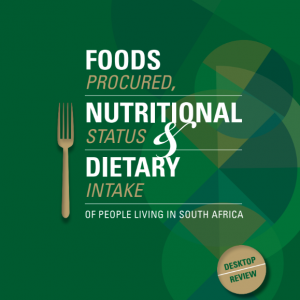
The estimated population of 58.8 million South Africans live in a country that is regarded as nationally food secure, but the divide in terms of access to resources and high unemployment continues to render a significant proportion of citizens food insecure and at nutritional risk. In addition, urbanisation is contributing to changed livelihoods and diets in both rural and urban areas. Food acquisition is primarily dependent on cash in food systems that are being transformed through the penetration of formal retail, international trade and globalisation.
In most parts of South Africa, subsistence agriculture has been eroded as a result of apartheid land policies and overcrowding. Inadequate agricultural extension services have resulted in even remote rural households increasingly relying on processed food from the formal food and retail system. Over the last 20 years, South Africa has experienced a significant nutrition transition, with the changing food systems fueling the rate of transition. The prevalence of obesity has increased drastically and currently co-exists with stagnant, high levels of stunting.
The nutrition transition has resulted in an increased intake of nutrients of concern like sugar, salt and saturated fats globally and it is assumed this picture is mirrored in South Africa. In the absence of national dietary intake data, Mchiza et al. concluded that energy and macronutrient intakes range from low in certain studies and adequate to high in urban areas. Consequently, the prevalence of hypertension, overweight, obesity and other non-communicable diseases are on the increase in adults. The formulation of strategies to arrest the obesity trend and the monitoring of progress with respect to existing interventions are dependent on up-to-date and comprehensive dietary intake information.
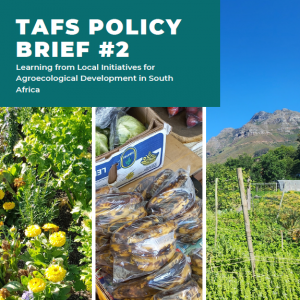
Synopsis
Transformation of food systems in line with agroecological principles remains marginal in South Africa. In spite of numerous policies, plans and programmes, limited change highlights the weak budgets, segmented interventions and lack of coordination. These problems reflect the power dynamics in the prevailing food system, which is dominated by large-scale conventional agriculture and food corporations.
At the national level, several social movements support agroecology, organic production and food sovereignty. These, however, lack the connection with consumers required to establish a coalition for change that could influence the political scene and lead to policy changes. Consumers are understandably focused on their current living conditions. As a result, no significant agroecological programmes are taking root nationwide.
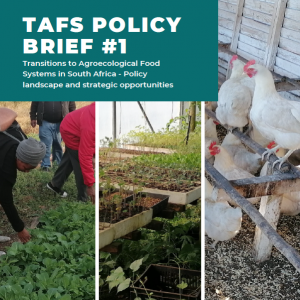
Synopsis for an agroecology transition in South Africa
In South Africa, access to food and adequate nutrition is a right enshrined in the Constitution. Yet, hunger is rife and food access is a daily struggle for more than 14 million South Africans (23% of the population), with malnutrition in its various forms being a significant health challenge. In parallel, South African agriculture is increasingly unsustainable in the context of climate change and environmental degradation. Transforming the food system is imperative.
Current approaches to transformation are restricted to incremental adaptations to the dominant agricultural model, primarily using Conservation Agriculture (CA)/Climate Smart Agriculture (CSA) approaches. While these may offer necessary pathways to greater environmental sustainability in commercial agriculture, they fall short of what is needed for transforming the food system.
To effectively address the sustainability crisis, a transformational change is needed where social dynamics must play a major role. This requires support for different producer categories, the development of new food networks supporting local food system dynamics, and improved participation based on consumer-producer collaboration. Progress must be cross-sectoral, throughout the food system, and at multiple levels simultaneously. An agroecological approach can recalibrate this system to achieve both ecological sustainability and social justice.
South Africa is in a position to consolidate these opportunities. Numerous policies, plans and programmes have elements that can be drawn together to underpin a national agroecology strategy and programme. Importantly, a national re-engagement can be facilitated by linking and learning from various local level initiatives where stakeholders can more easily engage in actions targeted at their common challenges. Districts and municipalities can play a major role by supporting synergies between sustainable and local development.
Year of publication: 2022
Place of publication: Rome, Italy; Brussels, Belgium; Montpellier, France;
Pages: #50 p.
ISBN: 978-92-5-136209-9
Author: FAO, European Union, CIRAD
Publisher: FAO; European Union ; CIRAD;
Abstract:
Food systems are intimately linked to our lives – through the food we eat, our nutrition and health, our livelihoods, jobs, and the environment and natural resources of the planet. The main challenge for food systems is to produce nutritious food for all while preserving our biodiversity and environment and ensuring equitable distribution of wealth. This Food Systems Profile provides a summary of the main food system issues in South Africa and highlights potential solutions for their sustainable and inclusive transformation. It is the result of a systemic analysis and stakeholders’ consultation that was part of a global assessment of food systems in over 50 countries, following a joint initiative by the EU, FAO, and CIRAD which aims at catalyzing the sustainable and inclusive transformation of food systems. Last updated 25/05/2022
Cite this content as:
FAO, European Union, CIRAD and DSI-NRF Centre of Excellence in Food Security (CoE-FS). 2022. Food Systems Profile – South Africa. Catalysing the sustainable and inclusive transformation of food systems. Rome, Brussels, Montpellier, France and Bellville, South Africa.
https://doi.org/10.4060/cc0071en
This review of the agroecology debate in South Africa is part of the research project Transitions to Agroecological Food Systems: a case for policy support (TAFS) launched in 2020. TAFS is a multi-country project coordinated by the French Agricultural Research Centre for International Development (CIRAD), with five partnership research platforms in three continents: ISA (Information pour la Sécurité Alimentaire), PP&G-GovInn (Public Policies and Governance), and SPAD (Systèmes de Production d’Altitude et Durabilité à Madagascar) in Africa; Malica (Markets and Agriculture Linkages for Cities) in South-East Asia; and PP-AL (Red Políticas Publicas and Desarrollo Rural) in Latin America.
TAFS collaborates with the Transformative Partnership Platform on agroecology (TPP) initiated by France and the CGIAR (Consortium of International Agricultural Research Centres) where it contributes to the policy component. The project is implemented in nine countries: Burkina Faso, Mali, Madagascar and South Africa; Laos and Vietnam; Argentina, Brazil, and Colombia. In South Africa, TAFS’ partner is the DSI (Department of Science and Innovation)-NRF (National Research Foundation) Centre of Excellence in Food Security (CoE-FS). The project is coordinated by Julian May (CoE-FS, University of the Western Cape) and Bruno Losch (CoE-FS, University of the Western Cape, and CIRAD).
The first stage of the project is implemented in collaboration with the Southern Africa Food Lab (SAFL) with the contribution of Scott Drimie and Stephen Greenberg. This report on The state of the debate on agroecology in South Africa was drafted by Stephen Greenberg and Scott Drimie. The authors acknowledge the contributions of Bruno Losch and Julian May on earlier drafts, and Raymond Auerbach (South African Organic Sector Organisation – SAOSO, Nelson Mandela University) for his review and comments. They also thank the contributions of those who participated in the NetMap sessions facilitated by Luke Metelerkamp.
With the COVID-19 pandemic exposing the shortcomings of the national and global food systems, the 2020 Food Dialogues came at an opportune time; bringing diverse voices into the conversations about how we bring about the changes we need in our food system to protect livelihoods and eliminate hunger, while at the same time dealing with the health and economic consequences of the virus and their mitigation. This report weaves together common threads from the wide range of speakers, topics, themes, and talks. It aims to be a resource that others can draw upon for guidance in shaping policies, activism, projects, and programmes to make a difference in our food system.
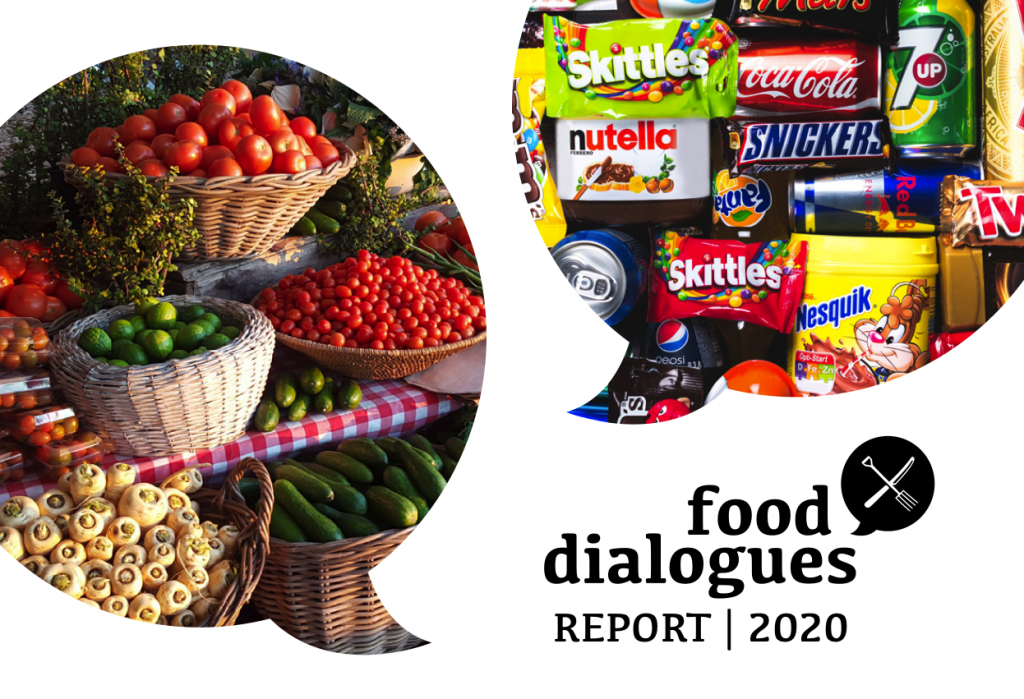
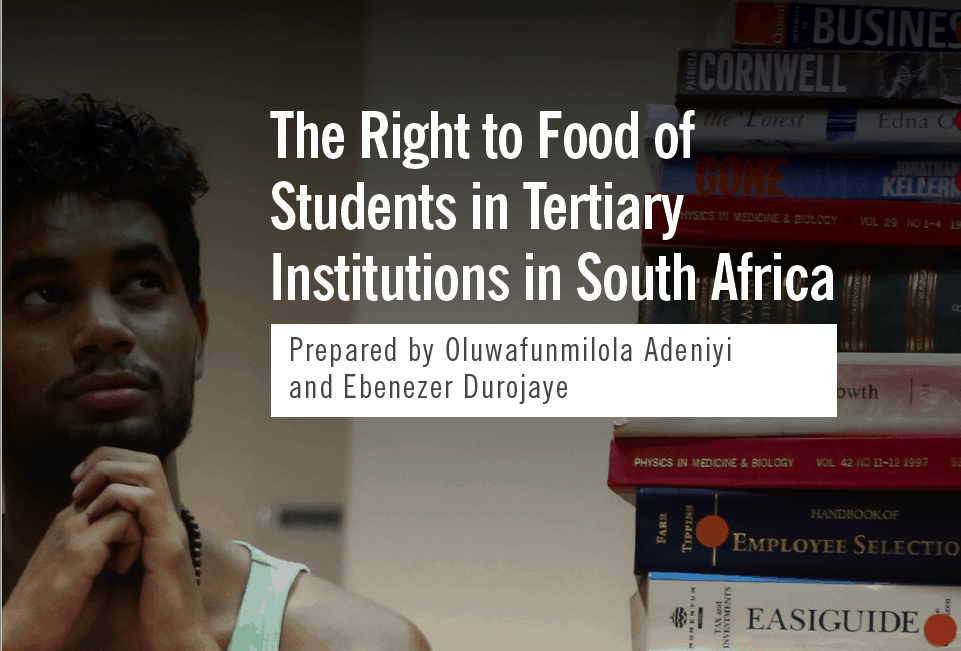
The right to food in South Africa is recognised and guaranteed in various laws at the international regional and national level.
The right to food in South Africa is recognised and guaranteed in various laws at the international regional and national level. Access to adequate food is a serious challenge across the globe, leading to hunger and malnutrition. Currently, 1 in 8 people worldwide go hungry every day. In 2015, the international community adopted the Sustainable Development Goals (SDGs), the second of which is to end hunger by 2030 and ensure that no one anywhere in the world is hungry or malnourished. Although South Africa is striving to meet the SDGs, hunger remains pervasive, with millions of people in the country suffering daily from hunger. Food insecurity is a reality for many, all the more so for vulnerable groups.
About 54% of South Africa’s township microenterprises trade in food or drink. More than two-thirds of these are grocery retail businesses in the form of spaza shops and smaller ‘house shops’. These are the predominant businesses within the ‘township economy’ and play an important role in food security, self-employment and community cohesion. In the last decade, the business of spaza shops (dedicated, signposted businesses with a range of foodstuffs and open five days per week or more) has undergone extensive change towards a new class of entrepreneurial traders – mostly foreign nationals. This change has meant that the sector has become increasingly controversial and associated with chauvinistic and xenophobic discourses targeting immigrants. While the nature, causes and extent of change in informal grocery retail markets have been noted by various authors over the past decade, there is as yet no comprehensive account of the changing nature of business dynamics and competitiveness in the sector.
Next Page »
